Description
ABSTRACT
The Lagos State Arbitration Law and the Doctrine of Covering the Field: A Review
Abdulrazaq Daibu*
1. INTRODUCTION
Lagos1 is a metropolitan city located in the south west geo-political zone of Nigeria. It has long been a trading/commercial hub of Nigeria and West Africa because of its commercial/economic importance; and is now one of the largest and fastest growing urban cities in the world.2 The commercial and economic position of the state naturally gives rise to disputes among business men and parties to commercial transaction, as disputes are inevitable in all human relation especially business transactions.3 Litigation is the traditional method of settling such disputes but, because of its attendant problems of delay, excessive cost, rigid procedures, unnecessary publicity and adversarial nature as well as the need to preserve and further their business relationships, parties in recent times now embrace arbitration and other Alternative Dispute Resolution (ADR) mechanisms which is faster, cheaper, less cumbersome, more effective and efficient to resolve their disputes.4 Arbitration is one of the most suitable means of resolving commercial disputes in Nigeria.5 It is an alternative method of dispute resolution in which a neutral third party (arbitrator) hands down a decision after a hearing, of which both parties have an opportunity to be heard.6 Arbitration involves a fair resolution of disputes between not less than two parties for determination in a judicial manner by person(s) other than a court.7 Arbitration is principally regulated by the Arbitration and Conciliation Act.8 However, after several years of its application, recent trends of development in investment, social -economic and commercial relation in Nigeria revealed that there is the need to review and probably amend the Act, to meet contemporary realities and developments in order to ensure its continuing efficacy and effectiveness.9
*LLB, LLM, BL. Lecturer, Department of Private and Property Law, University of Ilorin, Kwara State.
- Lagos State is one of the 36 states of the Nigerian Federation. See section 3(1) of the Constitution of the Federal Republic of Nigeria 1999 (as amended).
- According to Financial Times, Lagos generate about a quarter of Nigeria’s gross domestic product. See Xan Rice report in Financial Times. Accessed 25 July 2014.
- Akanbi M.M. ‘Contending Without Being Contentious : Arbitration, Arbitrators And Arbitrability’ (Being the 152nd University of Ilorin Inaugural Lecture delivered at the University of Ilorin Auditorium on 13th November, 2014) p.3; Adekilekun M. T., Olatunji O. A., Gan C.C. and Akanbi M.M, ‘Public-Private Partnership Initiative in Nigeria and its Dispute Resolution Mechanism: An Appraisal’ (2013) 40 Journal of Malaysian and Comparative Law 67-68; Olorunfemi J.O., ‘The Effect of Arbitration Agreement on The Jurisdiction of the Court in Nigeria’ (2009) 2 Nigeria Journal of Public Law 310
- Daibu A.A., ‘Application of the Rules of Natural Justice in Arbitral Proceedings in Nigeria’ (2013) 1 Ife Juris Review 56; Bukar B.A. ‘Emerging Trends in Alternative Dispute Resolution: From Mono Door to Multi-Door’ (2013) 79 Arbitration 72; Akanbi M.M., Domestic Commercial Arbitration in Nigeria: Problems and Challenges (Lambert Academic Publishing Germany, 2012) 32; Ajogwu F. Commercial Arbitration in Nigeria: Law and Practice (Mbeyi & Associates Nig Ltd Lagos, 2009) 5.
- Daibu (n 4) 58-59.
- Abdulrauf L.A. and Daibu A.A., ‘Challenges of Section 20 of the Nigerian Admiralty Jurisdiction Act to International Arbitration Agreements’ (2013 – June 2014) 2 Journal of Contemporary Law 33-34; Daibu (n 4) 56; Akanbi, Domestic Commercial Arbitration in Nigeria (n 4) 47; Adewuyi T.A, ‘The Effect of Section 20 of the Admiralty Jurisdiction Act No 59 of 1991 on International Arbitration Clauses’ (2006) 1 University of Ilorin law Journal 1;Bernstein R. et al, Handbook of Arbitration Practice ( 3rd edn,
1998, Sweet & Maxwell, London) 13; Black’s Law Dictionary (6th edn, West Group Publishing Co. 1990) 105 - Olorunfemi, ‘The Effect of Arbitration Agreement’ (n 3) 310; Sambo A O. and Akanbi M.M. ‘Sulh as a form of Dispute Resolution’ Adnan Trakic edn, Islamic Banking & Finance: Principles, Instruments & Operations (2012) The Malaysian Current Law Journal, Sdn Bhd, Malaysia 375; Ajogwu F. Commercial Arbitration in Nigeria: Law and Practice, 5 ; Akanbi ‘Contending Without Being Contentious’ (n 3) 4; Halsbury’s Laws of England (3rd edn, London: Butterworths, 1964) vol 2, para 501.
- Cap A18 Laws of the Federation of Nigeria 2004 hereinafter referred to as the ‘Act’ or ‘ACA’. The Act was passed during the military regime as a Decree in 1988 and is deemed to be an Act of the National Assembly by virtue of Section 3I5 of the Constitution of the Federal Republic of Nigeria 1999(as amended).
- Criticisms include delays in enforcement of awards and confusion caused by the effect of inconsistent provisions e.g. sections 4 and 5 of the Act. See generally Akanbi M.M. ‘Challenges of Arbitration Practices under the Nigerian Arbitration and Conciliation Act of 1988: Some Practical Considerations’ 325-351; Idornigie P.O. ‘Overview of ADR in Nigeria’ (2007) 73 Arbitration 75-76; Idornigie P.O., ‘The 1988 Nigerian Arbitration and Conciliation Act: Need for Review?’ (2003) 2 Intl. ALR 50-58; Rhodes-Vivour A., ‘The Federal Arbitration Act and the Lagos State Arbitration Law: A Comparison‘ accessed 7 December 2014

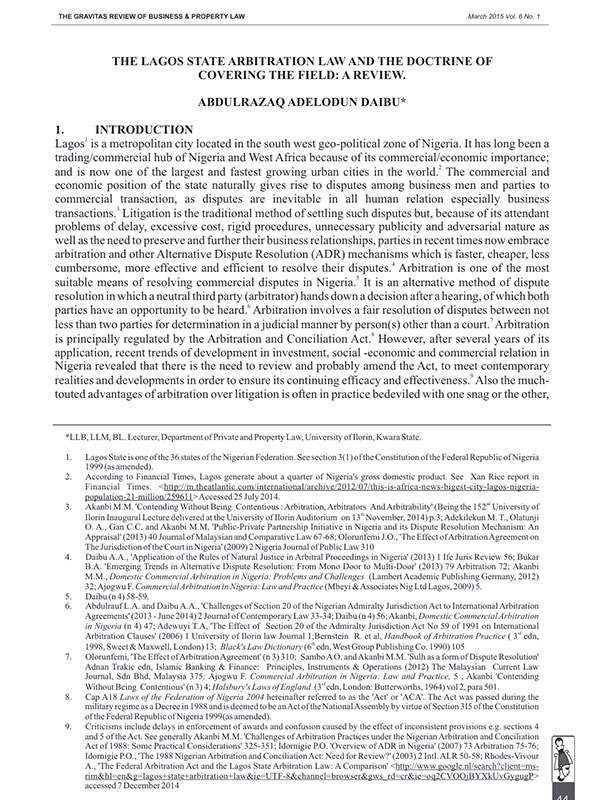
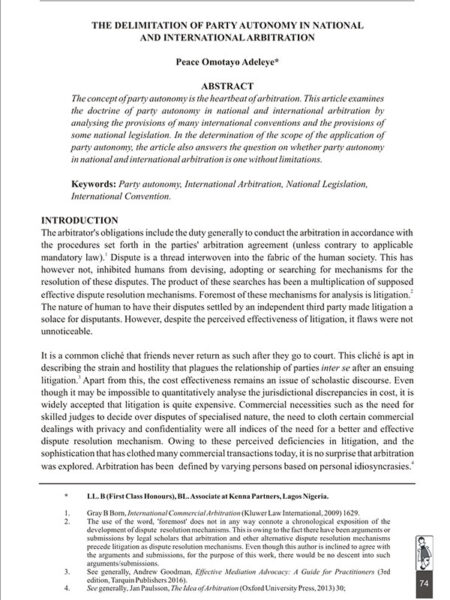
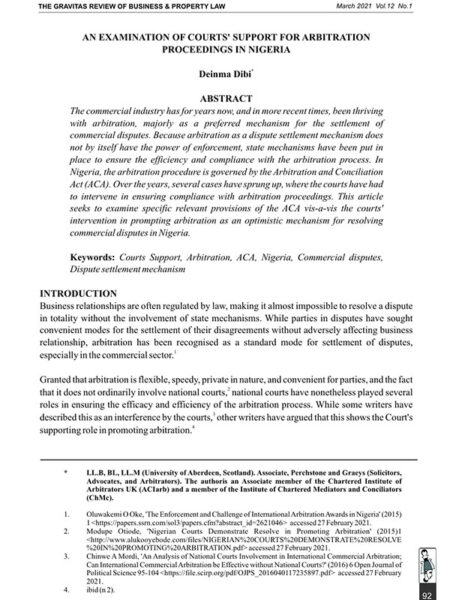
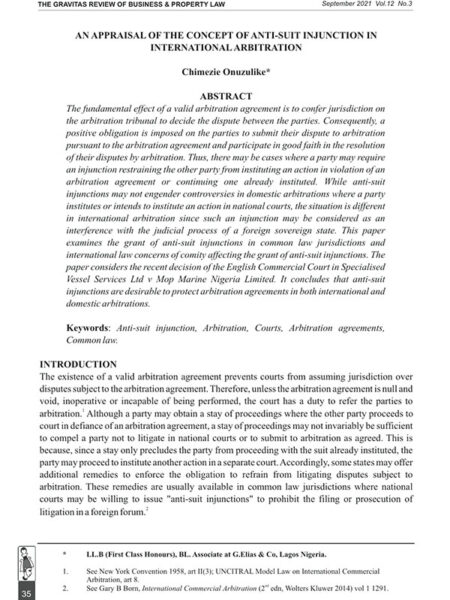
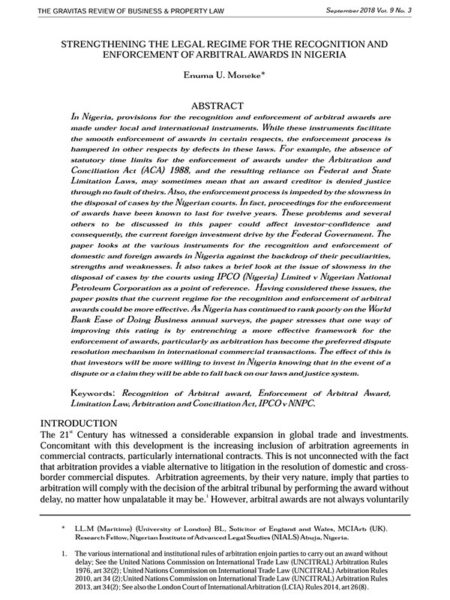


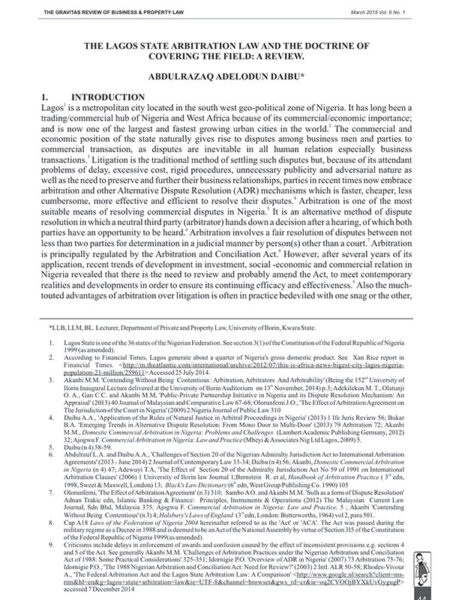
Reviews
There are no reviews yet.